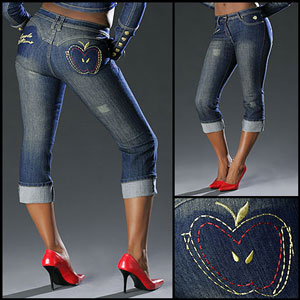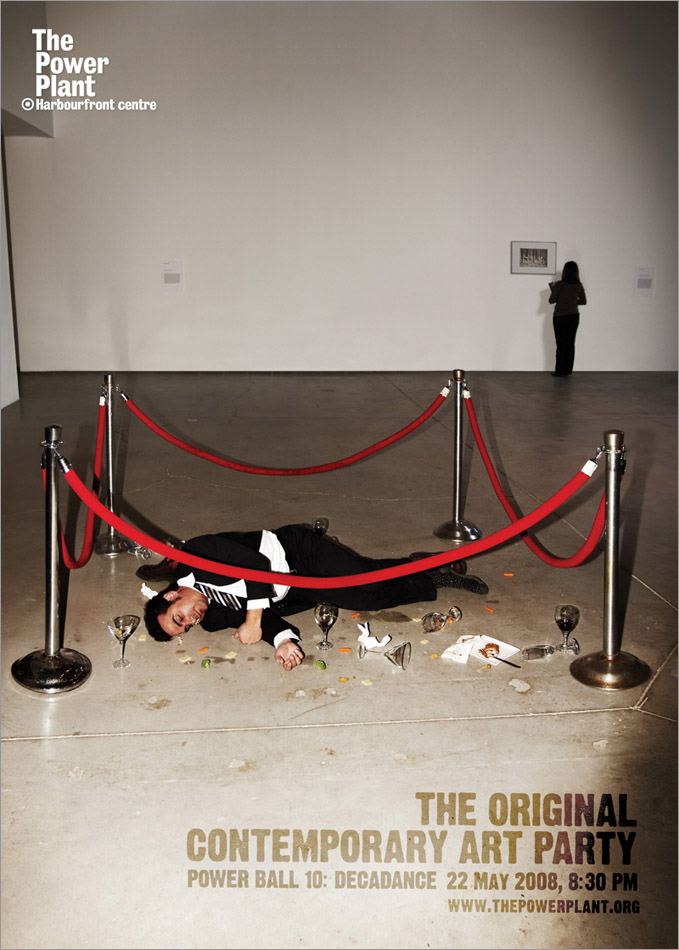it seems that the Don't Vote video i discussed here yesterday has caused quite a stir in the advertising and marketing community, from a number of age ranges and locations, like Public School Intelligentsia and Dear Jane Sample, both of whom are devoutly, it seems, against it. in a way, rightfully so. it's unappealing. but...
i think that there has been sight lost on the target group for the video. it's not meant to convince jaded 30-40 somethings to vote through use of the wiles of overpaid celebrity--you and i see through that by now. neither does it appeal to my age group, unless they act younger, because many of us have graduated college, have decided to vote or not vote already, have assessed our politics, and so forth. as such, we likely won't care about the spot.
it is meant to appeal to high schoolers and recent high school grads, whose attentions spans, as i've mentioned and many know, are incredibly difficult to capture. you can't coddle them like mommy and daddy or tell them what they should do. they're teenagers, they're rebellious, and likely, they don't give two shits about you, the government, or Wall Street. but if you get their back up by being condescending, you may just have a shot. MAYBE. though to get them to watch for 4 mins is asking a lot of the ADD generation.
to verify my thought process on this, i tossed my brother, a high school aged kid, the video. told him to watch it and just tell me what he thought. no prepping, no framing. then i asked him a few pointed questions: would it have made you register to vote? what did you think about the use of celebrities? what did you think about the use of sarcasm?
--
the responses were as follows:
on voting:
it would have persuaded me to vote, within reason yes i would try to but it would be put on a list of personal priority meaning i'd get to it asap but i wouldnt go out of my way instantly to do so
on sarcasm:
if i could vote, and wasnt planning to, it sure would've made me feel like crap. their approach was very sarcastic (obviously on purpose). i think the sarcasm was just right, but as i said it would come down to personal priority to whether or not i left that second to register
on celebrity:
sarah silverman(silvermen? sp?) was a little over the top with her...nonsense - it didnt fit well with the seriousness of the video. otherwise they worked well together.
any other thoughts:
ME: if i hadn't told you, specifically, to watch the whole thing, would you have if you stumbled on it?
HE: with a proper description and/or title, yes. i dont just click randomly at yt vids
ME: do you want to add anything else?
HE: the length was abit much, only when they started "waiting" for you to register
--
i don't profess that my brother is the be-all end-all answer; in fact, he's atypical. he's highly aware, interested in politics, and extremely bright. if you were following me on twitter, you noticed that i didn't think he'd like it, since he tends to have views nearly as mature as ours. so if this video works for him, i urge you to think about that, and to ask others in the high school age group what they think. no prepping, no framing. just, does it make you want to vote? food for thought.
10.02.2008
that DeclareYourself voting vid? think twice.
9.30.2008
Facebook facelift reveals a shift

well, it's official. like i said. facebook is no longer about the college age demographic. it shed that skin last night. it's leaving the 13-25 scene to Myspace with a firm kick and something like 'good riddance!'
it seems that by forcing all users to upgrade to the new, streamlined layout, the new projected image is supposed to be more professional, and as a friend pointed out, certainly more viable for marketing opportunities. add to that the new iPhone app and then tell me how many people in the 13-25 age range you know that own an iPhone--and well, you get the idea.
expanding its target to gain traction with a wider age range of users, making it more media viable, and adding support to items like the iPhone, only further go to show that Facebook isn't really interested in helping you connect to your friends any more.
you see, you only have so many friends, really, and they want more users than that. so the tag line on the new, improved home page has moved from the "people around you" controversy to "people in your life"--even that person you WoWed with 3 years ago in South Africa. i guess now it's okay to "make new friends." especially if they're out of school and make/spend money.
UPDATE 10.02 via Darryl Ohrt: now supported by stats from Matt Dickman. seems we were having similar thoughts.
8.26.2008
branding makes you better in bed.
a funny facebook forward i got
---
You go to a party and see a sexy girl across the room. You go up to her and say, "Hi, I'm fantastic in bed, what about it?"
That's Direct Marketing.
You go to a party and see a sexy girl across the room. You approach her to get her telephone number. The next day you call and say, "Hi, I'm fantastic in bed, what about it?"
That's Telemarketing.
You go to a party and see a sexy girl across the room. Your friend goes to her and says, "Hi, my friend over there is fantastic in bed, what about it?"
That's Advertising.
You go to a party and see a sexy girl across the room. You get up, straighten your clothes, approach her and pour her a drink. You open the door for her, pick up her bag after it drops, offer her a ride, and then say, "By the way, I'm fantastic in bed."
That's Public Relations.
You go to a party and see a sexy girl across the room. She comes over and says, "Hi, I hear you're fantastic in bed, what about it?"
That's the power of Branding!
8.07.2008
thin women effect: hating self, loving brands.
 according to a study reported on by AdAge, thin women in advertising make women feel poorly about themselves, but good about the brand. viewers will eat less or choose low-calorie options after seeing a thin model, feeling inadequate, but will like whatever product better; yet, when faced with a "normal" sized woman, women are less inclined to purchase the advertised product, but won't monitor their eating. the study was comprised of "a sample of 194 college students aged 18-24."
according to a study reported on by AdAge, thin women in advertising make women feel poorly about themselves, but good about the brand. viewers will eat less or choose low-calorie options after seeing a thin model, feeling inadequate, but will like whatever product better; yet, when faced with a "normal" sized woman, women are less inclined to purchase the advertised product, but won't monitor their eating. the study was comprised of "a sample of 194 college students aged 18-24."
i feel the need to address this, especially because it's getting attention as a reason for marketers to return to skinny models: they sell product better.
i don't think this is the case. i think for a long time now, women have been living in 'the valley.' no, not like valley girls. i mean this trench from which we try to crawl out of. on one side, expectations and traditions (and don't you dare get me started in a debate by saying 'but they aren't there any more'--bullshit); on the other side, a long way up and out, paved with dogmas and philosophies difficult to navigate, aiming to feel alright in this world and in our bodies.
this shift is still changing.
the valley is getting smaller, but it will take time. this movement is helping more than hurting, if marketers/brands can suck it up a while longer. only in the past decade (being generous) have girls been able to see 'real women' in the media around them. wait for these girls to grow up. then tell me about their confidence, their eating habits, their response to thin models. if the same results hold in 20 years, then i'd consent to maybe there being something in it.
because right now, the valley effect is such that women see skinny women in skinny jeans (for example). that's a goal and aspiration that they were brought up (in many cases) to fulfill, understanding that this is what our Western society views as desirable. they want to be the skinny woman so they can buy the skinny jeans. thus, they get down on themselves, eat less, and do like the brand more--it's a status symbol, a version of self-growth and attainment/contentment.
that is removed for current 18-24 year olds, many of whom grew up on Britney Spears and Spice Girls, when they are shown images like themselves. there is no push to better oneself, no goal to reach, no status attached to something they can readily buy. to put it in perspective: the iPhone. if it was cheap and easy to get, tech geeks wouldn't be all over that shit. the iPhone are the skinny jeans of today's market gurus.
but that desire for the skinny jean will dissipate when it is no longer a status symbol. if the regular jeans are as desirable as the size 00s. to extend the metaphor, when it becomes more about the cut and style of the jeans, rather than the size. this is the shift. don't cut it off from happening. the study also found that seeing regular women was self-affirming, though brand-denying. but i should know better than to ask the industry to consider the end user over the almighty dollar.
[side note.
i'm not even getting into the fact that 194 students is a shitty sample size to be parading this data around on.]
8.06.2008
you can still scramble an egg.
 or hard boil it. or poach it. serve it benedict or sunny-side-up.
or hard boil it. or poach it. serve it benedict or sunny-side-up.
...you get the picture. all i mean to say is perhaps the "chicken-and-egg" theory isn't entirely irrelevant with regards to content vs. context, as a recent AgencySpy post discusses.
as for the preliminary topic of whether content or context is more important in advertising--that is, creating engaging stories versus knowing consumer values--i agree with Frank Scherma on that one. or at least, i think i do. a link was not provided to his actual opinion, but i'm told that it lands a mixture of the two. (test tube eggs?)
i think that, in order to be effective, you need to understand and know your audience first. really know them. don't "think" you know them--most likely, you don't. know them again. you need to care about what they care about. love what they love. be intrigued by the same facets and hold similar priorities. at least when considering strategies.
then, taking that understanding, you craft engaging stories to communicate how a good product can be great for them. because no one wants to hear those exact words: "our product is wicked awesome! for all your _____ needs!" yeah, sure. it could be the exact bloody perfect thing i need, but by then i'll have already tuned it out.
as for the argument that ads may become the overbearing father at a malt shop (to mix blog metaphors for a moment), i'm not sure that's entirely true. YES a lot of purchasing now relies on word of mouth and on credible consumer reviews. YES this shifts the way that some products communicate. key word being some.
"clever ad campaigns be damned" only works when i really give a shit about where my money is going. for example, i'm going to research my digital camera, or my wireless mouse, or what flight carrier i choose, or my cell phone, lap top, insert fancy toy of choice here. point being: fancy toy of choice. i will research when i have to. i will take consumers into account when i want the most value for my buck.
but if i'm buying a new food product i've not heard of before, or buy new music i hadn't heard before, i am not researching that. i am looking at packaging (especially for those impulse buys that get me going back for more). i am watching commercials (anyone notice how more and more, commercials will have little paragraphs at the bottom citing song & artist? no joke.). i am remembering that advertisement i had to sit and stare on for an hour on a bus ride. or a billboard in traffic.
because, dammit, i don't need your opinion on my pack of gum.
consumers are willing to be more risky (take less advice) with (relatively) less expensive items. because of this, we are never going to get rid of the context/content part of the advertising show. we just don't want to be bothered researching every little thing. so while an iPod adapter, of relatively significant cost and quality, will be researched, that song on the commercial i heard will not.
i think the propensity to believe that everything will move toward consumer reviews and recommendations is a symptom of the echo chamber of us tech geeks, who like to be in the know and research every bloody thing, right down to whether or not i should purchase a $34 dress from TrashyDiva (i did, by the way). but take a step back.
try asking people how they came to purchase their last new items (new, meaning have not purchased before). i think you'll find the trend. at least, that's how this observation came to me. i do believe alan's "prom king" theory is entirely correct because it relies on what brands we spend money to care about; brands who say something about us when we choose them. but for those products we can afford to care less about, clever commercials still suffice.
people ignore irrelevant advertising. make it relevant (know your audience and apply that knowledge) and people will start to care, too.
ceci n'est pas un oeuf.
7.30.2008
hate hate: keira knightley. & boobs.
 alright, i don't hate boobs. but i do hate keira knightley. her poor excuse, stoic, mouth-acting has ruined every single period piece film for the past half a decade (i won't get into star wars or pirates). and the only historic one she didn't corrupt was overrun with her twin natalie portman.
alright, i don't hate boobs. but i do hate keira knightley. her poor excuse, stoic, mouth-acting has ruined every single period piece film for the past half a decade (i won't get into star wars or pirates). and the only historic one she didn't corrupt was overrun with her twin natalie portman.
but, as Adrants has pointed out, keira did something maybe kinda halfway decent (arguably for the first time). she declined post-production touch-ups to enhance her breasts for the collateral on the new movie The Duchess. and you know what? i'm more than okay with that. dare i say i wish other actresses would follow suit.
it's nice for someone to make a stand like that and say, my body is good the way it is. kudos to keira for that. the real thing is, though, i wonder how many magazines are going to cover this information, or is it just going to be an afterthought (somewhere after the thought 'did she get a breast reduction?'). i recognize it's all over google and the celeb dish blogs, but i'm talking about the kids.
i would love for a girls' magazine to cover this, interview her, and let her be that role model. i want to see it in Elle Girl, in CosmoGirl, in Seventeen, in YM. disappointing to just have it fall by the wayside, covered by us folks intrigued by advertising and photoshop, and not the folks who should be sending the message.
7.21.2008
how facebook ads are expanding gender use.

i think i'm actually an advocate of the above ad. minus the "fail" part.
courtesy of failblog.org
5.14.2008
baby derriere dereon.
 i've been ruminating on this post for part of the day now.
i've been ruminating on this post for part of the day now.
apart from that a girl's line of Beyonce's Dereon is so forgettable it never made it to my list of top things i never wanted to see created, i wanted to consider exactly why i found it repulsive. other than the fact that, you know, good feminists say stuff like that. [though the definition of 'good feminist' changes daily, so i really don't try to keep up.]
i'm cranky because there are about thirty different ways this ad could have looked. using the same ridiculous clothing. the girls are too young to know what they want to wear. they shop where Beyonce-loving fashionista mommy shops. you ask that mom if they want to overtly want their daughters to look trashy-hip, chances are they'll disagree--or don't see it as trashy-hip.
this should have embodied more about what the brand embodies to those people who buy it. style, sure, no doubt. but c'mon, it's Beyonce. how about a freezeframe of the girls in the clothing; one singing, one playing drums on the couch, one with air guitar? girls doing something and being stylish. i see that poorly executed there, with the piano and the faux-posed guitar groupie shot. it looks like someone had a good idea and it got trampled.
what about hearkening back to the princess, as was suggested in the post? that is, the one girls wanted to be when they were little. give them dolls. let them play. lord knows the Bratz dolls would fit right in stylistically. or better yet, before i get on a rant on dolls/Bratz, what about a campaign in which girls model their moms? show a shot of mom in Dereon in a record store, with her daughter in Dereon next to her shopping as well. family, solidarity, style.
...you're telling me there was nothing better than bee-stung lipped 8 year olds who, frankly, look uncomfortable in that ad?
5.13.2008
Yeas & Nays: III
 the site, adgoodness, re: party art Power Plant
the site, adgoodness, re: party art Power Plant
Riot saith: YEA!
despite the following comment on the adgoodness post (where you can also see the other 2 in this campaign) -- Although it’s pretty lame photography, and the models them selves are not that interesting. Nor is the scene all that believable in the case of the third one.. It’s a good concept. 3/5 not so much on the execution though. -- i like this campaign. i don't think the photography is particularly 'lame.' it reminds me of a campaign i did for the Museum of Modern Art. as in--trying to make the prospect of a museum not boring to anyone who doesn't already go. making the museum into the party is, i counter, a clever idea. especially when modern and contemporary art lends itself to some wacky and interesting pieces. not to mention, it ties into the fact that they're actually hosting a party, which doubles on its usefulness. kind of like that "go metro. miss traffic" ad.
the site, brandweek, re: targeted ads
Riot saith: DUH!
haven't i been saying this for, oh, say... ever? yes, i think so. "These users want, and welcome, information about new products, savings and other offers, and they're clearly stating that if the ads were more targeted and relevant, it would be worthwhile to them," said Jere Doyle, CEO of Prospectiv. no shit sherlock. we need studies for this? i shouldn't talk. i know it takes a lot to convince people who don't already see that. but i feel like i'm seeing a lot of things quoted, referenced, and studied lately that make me go "DUH!?" isn't that a GIVEN? i'm going to start keeping track of things that make me go "duh" rather than make me say "huh!" am i alone in this feeling? or do people just need validation on the obvious?
the site, greg verdino, re: 'generation v'
Riot saith: NAY!
don't get me wrong. it's truly not all bad. like greg points out, some of my peers don't know what Twitter is. me, i've never used, or wanted to use, Second Life. i don't podcast, even if i know what it is. but to claim that "the generational distinctions break down" online is an unfair and, i believe, flawed generalization. i'm all about connecting human experiences, but you need to understand that each human has a distinct experience they bring to the table. my values are radically different than the generation before me, and no amount of Facebook Chat is going to rectify that. not to mention, HOW each generation comes to the "virtual generation" is different. how and why we interact with it is often different. how we think about it, craft ourselves, to why, and why--all of these are different. my little brother's reason for using Myspace is not my aunt's reason for using Myspace. it's simply not. i think that to fall prey to this idea as a new "generation merger" is a product of living too long in the social media state of the internet bubble. treating each personae, even if a person has multiple personae, different from a marketing standpoint does have merit. i'm just saying that not everything is that easy, and i do believe digital natives--whether or not they podcast as well as a 35 year old--do come to the virtual table for different reasons, values, and views. technographics is a better answer, to me, than "generation v." i find the umbrella term dangerous.
4.15.2008
'the stone gods' and why it matters.
i am that lit geek.
my 100th tweet [don't ask, i don't really care the number] was about Jeanette Winterson's The Stone Gods. i didn't even know. woo! personal landmark. i'm such a winterson dork.
anyway, the tweet was:
"strange question: have any of you read The Stone Gods by Jeanette Winterson?"
why is this fiction book important? everyone's twittering about ad:tech, and @alisamleo was talking about:
adtech: "are people getting freaked out" by individualized, behavioral targeting?
>> 39 minutes ago from web
adtech: well....depends on the age group. younger users don't care, its the internet economy...
>> 38 minutes ago from web
which got me thinking about how i'm still a little weirded out by it. i don't know if it's generational (am i not considered a young user anymore? i'm only 22) or just that i'm aware of what's going on; either way, i am still cautious about individualized targeting--even as i advocate it (see previous posts about choosing what our txt ads should be in order to keep relevance high).
The Stone Gods is similar in concept to other futuristic books. if you've read Margaret Atwood's The Handmaid's Tale, The Stone Gods is pretty much the direct inverse combined with Brave New World. among other themes, The Stone Gods addresses characters in a world that is hyper-marketed, hyper-targeted, and hyper-relevant. the computers know what you want before you do, right down to what you should wear (i'm sure Kenny Cole would love that -insert eyeroll here-). everything was so individualized that everyone began to be similar anyway, but it was what was desired regardless.
question posed: effective, yes. useful, perhaps.
but is this the kind of world you personally would want to live in?
no judgments here. i'm just honestly curious if you believe it would be beneficial, easier, and less stressful, or if it would "freak you out" about privacy etc.
4.09.2008
i liked a commercial how much?
enough to go out of my way to find it on youtube and embed it for you here, just in case you haven't already seen it.
this delivers. it's excellent. it speaks exactly to the target market in memorable and admirable way. how do i know? if i'd gone to grad school, they'd be talking to me. we are those kids who work our asses off to get the grades to get the school to get the bucks to get the (car/land/family/etc).
except for when we sit there in (insert office setting here), look at this well-worn path and say to ourselves, "whoa. where along the line did i agree to that? where did i get lost in here? what part of me is left in my own plans?"
breaking the cycle speaks to that "whoa" moment in the ambitious, determined group. i love it. if i had that kind of money, it might sell me on an audi--or at least get me interested enough to do my research. three cheers for poignant relevance.



